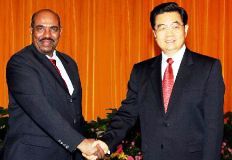China unlikely to bow to critics on Darfur
May 21, 2007 (BEIJING) — China has signalled during a week of high-level diplomatic wrangling over the Darfur crisis that it is unlikely to bend to global pressure and change its much-criticised policies on Sudan.
 Beijing has been showered with international condemnation over its support for the Khartoum government, accused of shielding Sudan from sanctions and abetting genocide in Darfur.
Beijing has been showered with international condemnation over its support for the Khartoum government, accused of shielding Sudan from sanctions and abetting genocide in Darfur.
The United Nations says more than 200,000 people have been killed and two million displaced in the fighting in Darfur. Khartoum says only 9,000 people have died.
On Thursday US President George W. Bush reiterated his support for a new UN resolution on Darfur and the imposition of sanctions to force Khartoum to open its door to United Nations troops.
But Chinese leaders including Prime Minister Wen Jiabao and newly installed Foreign Minister Yang Jiechi have resisted pressure to shift Beijing’s policy of opposition to UN sanctions.
“We hope that this issue will be resolved properly through dialogue and negotiation,” Yang said Friday. “On the Darfur issue in Sudan, the position of the Chinese government is consistent and well known.”
On Sunday, the Sudanese government renewed its opposition to the deployment of UN peacekeepers after talks in Khartoum with China’s newly appointed special envoy on Darfur, Liu Guijin.
The seasoned diplomat was named as envoy on May 10, shortly after 100 US lawmakers signed a letter calling on Chinese President Hu Jintao to take immediate action to stop the bloodshed in Darfur.
“The international community is stepping up to its responsibilities, but unless China does its part to ensure that the government of Sudan accepts the best and most reasonable path to peace, history will judge your government as having bank-rolled a genocide,” the letter to Hu read.
The lawmakers’ warning are echoed by activists such as Sudan’s Ali Askouri, who say that the Khartoum regime has no internal support and has been propped up by China since 2000.
“The first country to become a Chinese colony is Sudan,” said Askouri, who head the Piankhi Research group and represents communities displaced by the China-financed Merowe dam project, the biggest hydropower project in Africa.
“This is because of the oil, the need for oil for their own internal security,” he added at a press event in Beijing last week.
Sudan sells more that 50 percent of its oil output to China, which openly admits having strong military ties with Khartoum.
Nevertheless, China is sensitive to the damage Darfur is doing to its efforts to promote itself as a responsible member of the international community and has also been upset at attempts to link the crisis to calls for a boycott of next year’s Beijing Olympics.
“There are a handful of people who are trying to politicise the Olympic Games,” said Yang, the foreign minister.
“Their objectives or the target they are seeking to achieve will never be attained.”
But according to some experts, the fundamental issue for China goes beyond oil and other issues to the heart of Chinese diplomacy.
Beijing’s principle of non-interference in the affairs of other countries was established more than 50 years ago by then foreign minister Zhou Enlai.
For China, Darfur is a matter for Sudan in the same way that Beijing views its own troubled regions as off limits to the international community, says Yitzhak Shichor, an East Asia expert at the University of Haifa.
“Beijing’s response toward the situation in Darfur reflects not only its pragmatic (economic) interests, but also its fundamental and ideological concerns,” he said in a recent commentary.
“For instance, in a hypothetical case of a conflict in Tibet or Xinjiang, China would never permit UN peacekeeping forces onto its territory.”
(AFP)
